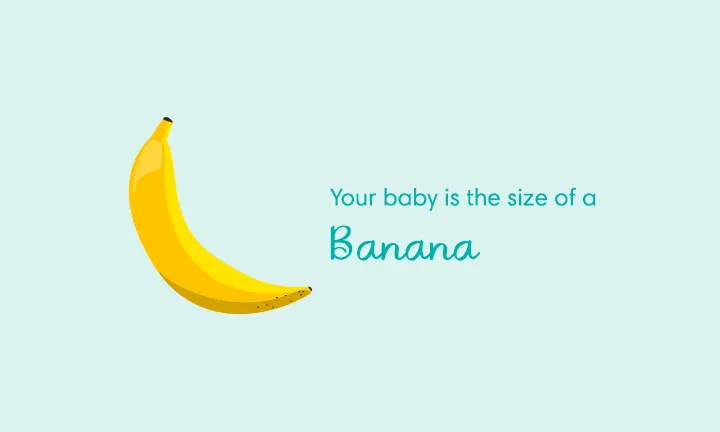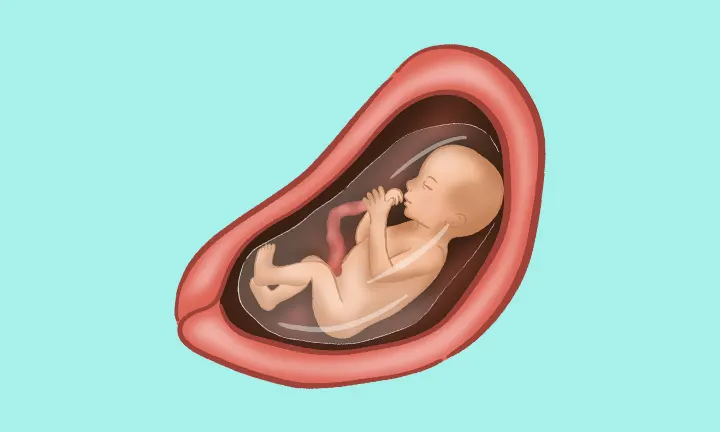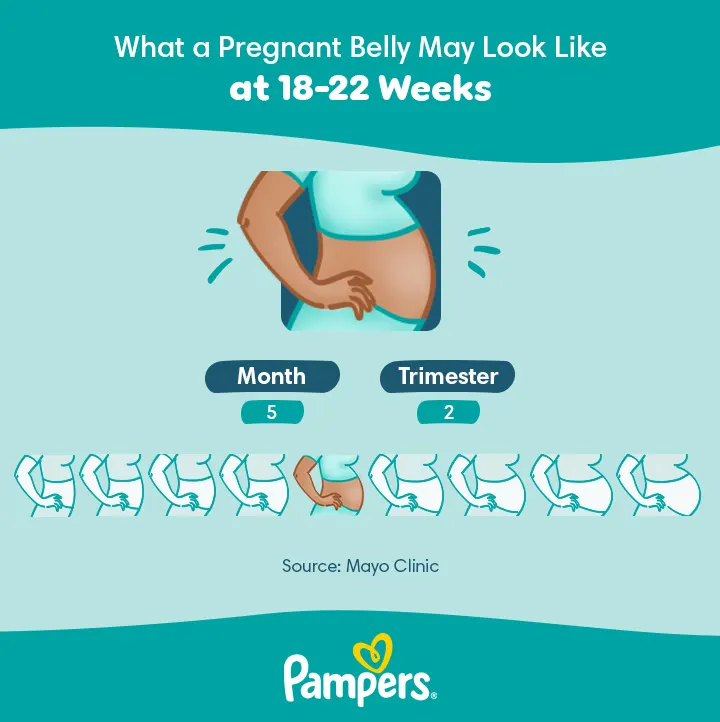21 Weeks Pregnant
You're now 21 weeks pregnant, and your baby is growing rapidly. At this stage, your little one is developing their sleep-wake cycle and can even hear your voice. As you navigate through the second trimester, there are many exciting changes happening both inside and outside of your body. In this article, we'll explore what happens during week 21 of your pregnancy, including your baby's development, common symptoms, and tips for staying healthy and comfortable with your growing bump.
Highlights at 21 Weeks Pregnant
Before we get into more detail about 21 weeks pregnant, take a look at the highlights below:
Your baby is about the size of a banana at 21 weeks pregnant, and they now weigh more than the placenta.
Their sleep and wake cycle is becoming more regular.
Around 21 weeks, your little one may be able to hear outside noises, such as your voice. This is the perfect time to sing them your favourite songs or read to them.
You may have some uncomfortable symptoms at 21 weeks pregnant, but with any luck you’re also experiencing a surge of energy in your second trimester.
Searching for the perfect name for your baby? Jump-start your search with the help of our Baby Name Generator below.
BABY NAME GENERATOR TOOL

Baby name generator
By gender:
By theme:
Your Baby’s Development at 21 Weeks Pregnant
It’s ‘all systems grow’ inside your bump at 21 weeks pregnant. Here are some developments taking place:
Your foetus has now overtaken the placenta in weight. The placenta will continue to grow and do its job of supplying all the nutrients and oxygen your foetus needs until they’re born.
Although your little one’s lungs aren’t quite ready to work outside the uterus yet, your foetus is practising breathing movements to slowly get ready for those first breaths.
Your baby now sports a layer of downy hair known as lanugo, which is thought to help keep your foetus at the ideal temperature. Most of it will usually be gone by the time your baby is born.
Eyebrows and hair are also sprouting around now. At 21 weeks pregnant, you may be starting to wonder whether your little one will come out as a beautiful bald baby, or with a luxuriant head of hair. This is anybody’s guess, but it doesn’t really matter either way – most babies lose any hair they’re born with in the first year.
When you’re 21 weeks pregnant, your little one can hear all sorts of noises through the wall of your belly. If you aren’t already in the habit of talking or singing to them, now might be a good time to start. If you’re a budding karaoke star, know that you’ve definitely got one little fan! This might also be the kind of bonding activity, you’d like to involve your partner in.
Feeling sleepy? You might not be the only one! Your baby is starting to develop their own sleeping and waking patterns. Keep in mind, these don’t necessarily sync with yours.
How Many Months Is 21 Weeks Pregnant?
Now that you're at 21 weeks pregnant, what is that in months? There are different ways to assign the weeks of pregnancy to months, but based on one common way of estimating the months of pregnancy, you’re in your fifth month.
What Size Is a Baby at 21 Weeks Pregnant?
Now that you’re 21 weeks pregnant your foetus is about the size of a banana, measuring close to 26.7 centimetres head to toe, and weighing in at around 350 grams.
Your Baby: What Does 21 Weeks Pregnant Look Like?
This illustration can help you envisage what your little one may look like inside your pregnancy bump at 21 weeks:
Your Body at 21 Weeks Pregnant
Around this time, your uterus is starting to grow more rapidly, and your appetite may be growing too. This can make it harder to resist some of those cravings you might be experiencing. It’s OK to give in to some of your cravings for chocolate and ice cream from time to time, but overall aim to keep to a healthy, balanced diet of nutritious foods like fruits and vegetables, protein, dairy and wholegrains.
While we’re on the topic of food, check out what foods to avoid during pregnancy as there may be some foods that are no longer on the menu for the last few months of your pregnancy.
You may have had some heartburn and indigestion earlier in the first trimester, which was mainly due to hormonal changes. Now, as your uterus grows it may start pushing up against your stomach. This can cause bouts of indigestion or heartburn, and these may become more frequent as your pregnancy progresses.
Reduce the likelihood of indigestion and heartburn by eating small amounts more frequently, instead of three or four big meals a day. Also, cut down on caffeine-based drinks and rich, spicy or fatty foods. If possible, try not to eat in the three hours before bedtime.
Other things that can make indigestion worse like smoking or drinking alcohol are not recommended during pregnancy at all, because they can harm your foetus. Even passive smoking is known to cause complications. Talk to your midwife or GP if you’re worried about any of these issues.
Your Symptoms at 21 Weeks Pregnant
Here are some of the symptoms you may be experiencing at 21 weeks pregnant:
Stretch marks. The rapid growth of your body can cause stretch marks. Not everyone gets these, but if you do, they’re likely to become more noticeable in the weeks ahead. They can start out a reddish hue but may eventually fade to a silvery grey colour after your baby is born.
Backaches. One of the common symptoms of pregnancy is back pain, especially in the lower back, and at 21 weeks pregnant, your growing belly is shifting your centre of gravity and pulling your lower back forward. The hormone relaxin is also loosening every ligament in your body. It does this to help your pelvis expand when it's time to give birth but because it also loosens the ligaments in your back, it can cause some back discomfort as well.
Pelvic pain. If you’re feeling pain in your pelvic area, at the front and centre at around the level of your hips, or across one or both sides of your lower back, or possibly lower down in your pelvis, spreading to your thighs, you may have pregnancy-related pelvic girdle pain, or PGP for short. You might also notice a clicking or grinding sensation when you move. The symptoms can get worse when walking, using stairs or doing anything else that involves moving your legs independently from each other. If you have these symptoms at 21 weeks or any time in your pregnancy, contact your GP or midwife. Starting treatment early is the best way to keep the discomfort under control.
Hot flushes. Pregnancy hormones and the increased blood flow to your skin may leave you feeling warmer than usual. To avoid feeling hot and bothered, try wearing loose clothing made of natural fibres. Switch on a fan and keep yourself feeling fresh by taking showers.
Leg cramps. If you feel any cramping in your legs, know that you’re not alone – this is one of those symptoms that many pregnant people experience in the second trimester. Leg cramps can last just a few seconds or up to 10 minutes. You may get them more often at night. It’s hard to prevent cramps completely, but regular calf stretches may help keep them at bay. Drink plenty of water, massage the muscles or soak yourself in a warm bath to ease the discomfort. Call your GP or midwife if the cramp lasts longer than 10 minutes, or if it’s accompanied by numbness or swelling in your legs.
What Size Is a Pregnant Belly at 21 Weeks?
Every pregnancy (and bump) is different, but at 21 weeks pregnant, it’s not unusual for your belly bump to be more noticeable. Your baby and uterus continue to grow, and your uterus may also be pushing up against your stomach as it expands, which can cause indigestion and heartburn (as we mentioned in the section above).
If you haven’t felt your baby’s first movements just yet, keep an eye out in the next couple of weeks, as these movements are usually felt for the first time between 16 and 24 weeks of pregnancy. For now, you may only feel a fluttering or bubbling sensation in your belly, but in the coming weeks, those foetal movements will become stronger. Prepare to feel some little jabs and kicks.
What Does 21 Weeks Pregnant Look Like?
For a better idea of what your belly might look like around 21 weeks pregnant, check out the image below.
Things to Consider at 21 Weeks Pregnant
Here are some helpful things to consider at 21 weeks pregnant and as your pregnancy progresses:
‘Eating for two’ is only a figure of speech – even if you’re pregnant with twins or triplets, there’s probably no need to double (or triple!) your calorie intake unless your GP suggests it. That doesn’t mean that sitting, standing and walking for two won’t feel like a lot of extra effort! Here are a few ways to help your body cope better with the physical challenges of pregnancy:
Look after your back by making good posture a habit. Try to bend at the knees when you pick things up, keep your back straight and supported when sitting, turn by moving your feet instead of twisting your spine, and wear flat shoes to help keep your weight evenly distributed.
Get enough rest and indulge in as many massages and warm baths as you can.
Gentle exercise is great for boosting your resilience to aches and pains. Think about going to a group or individual class, or maybe try some prenatal yoga or aqua-natal classes.
Regular pelvic floor exercises can help strengthen the muscles in your pelvis. These muscles can come under a lot of strain during pregnancy and vaginal delivery, so pelvic floor exercises can help. It’s never too late – or too early – to start, and you can do them anywhere. These simple exercises only take a few minutes to perform. All you have to do is repeatedly clench the muscles you usually squeeze to stop yourself from weeing. If you’re unsure whether you’re doing these exercises the right way, ask your midwife or GP for advice.
When you’re pregnant, it’s important to get enough of certain vitamins and minerals, including iron and calcium. Iron is used to make blood cells, and a deficiency can make you tired and can sometimes lead to anaemia. Lean meat, green leafy vegetables and certain nuts are good sources of iron. Calcium is a vital building block for your foetus’s developing bones and teeth. It’s found in dairy products, bread and some fish like sardines and pilchards. Your GP may suggest you take supplements if you’re not getting enough through diet alone.
Vitamin D is important for healthy bones, teeth and muscles. Your body makes vitamin D when your skin is exposed to sunlight. If it’s winter or if you tend to avoid going out in the sun due to sensitive skin, your GP may suggest taking a vitamin D supplement.
Feeling stressed? Pregnancy is a special time, but that doesn’t mean you won’t feel anxious or tense from time to time. Reach out to your partner, friends and family for support, and speak to your midwife for some tools that can help you cope with stress.
The next couple of months are a good time to get some preparations out of the way, especially as your energy levels might dip come the third trimester. Things like getting your baby’s nursery ready, writing a list of all the baby gear you’ll need and creating a baby budget are all things you can start now, if you haven’t already.
If you discovered you were expecting twins during an earlier ultrasound, read our FAQ on twin pregnancy.
Tip for Partners Be open to different ways of being intimate with your pregnant partner. Many aspects of pregnancy, such as weight gain, hormonal changes, and worries about what may lie ahead with labour and childbirth, may lower your partner’s desire to have sex – and that’s normal. Take note of their mood and find other ways to express intimacy besides sex, from holding hands to kissing, cuddling, and touching. For most normal pregnancies, it’s OK to continue having sex, if both partners are up for it; just check with your GP first. |
Questions For Your Doctor at 21 Weeks Pregnant
If you have any questions or concerns at 21 weeks pregnant or any time during your pregnancy, your GP or midwife is always there to guide you along the way. Here are some common questions at 21 weeks:
Should I be taking any vitamin supplements now that I’m 21 weeks pregnant?
Are there any changes I could make to my diet to help me get more vitamins?
Is it safe to take painkillers for my back pain?
Will I have an ultrasound at 21 weeks pregnant?
What is a doula, what are the benefits of having one, and where can I find one?
What are the signs of gestational diabetes, and do I have any of the risk factors?
FAQS AT A GLANCE
Although there are various methods of dividing the 40 weeks of pregnancy into months, at 21 weeks pregnant you’re likely still 5 months pregnant. In the next week or 2, you’ll enter your sixth month.
21 Weeks Pregnant: Your Checklist
As you hit the halfway point in your pregnancy, consider some of the following to-dos:
□ Get a footrest to elevate your feet slightly whenever you sit. This is a great way of relieving slight swelling.
□ Ask your midwife or GP if you qualify for free vitamins and food vouchers under the Healthy Start Scheme, and ask how to apply.
□ If your friends or family are throwing you a baby shower, get your baby registry sorted so that it’s ready by the time the invites are sent out.
□ Keep on researching those names. If you’re 21 weeks pregnant with a girl, check out some of these top baby girl names. Looking for a boys’ name? Get some inspiration from our list of popular baby boy names. If you don’t know your little one’s gender yet, you might want to add some of these gender-neutral baby names to your shortlist.
21 weeks pregnant - checklist
How We Wrote This Article The information in this article is based on the expert advice found in trusted medical and government sources, such as the National Health Service (NHS). You can find a full list of sources used for this article below. The content on this page should not replace professional medical advice. Always consult medical professionals for full diagnosis and treatment.


